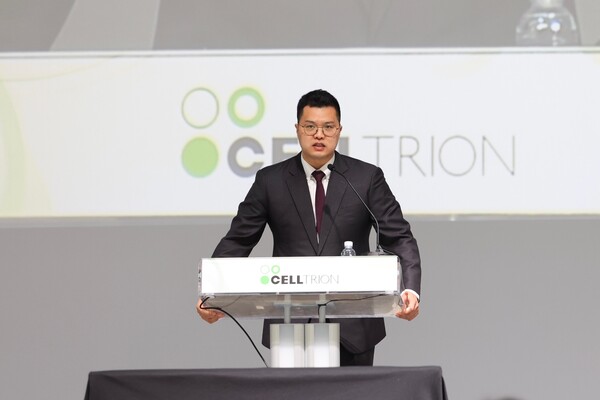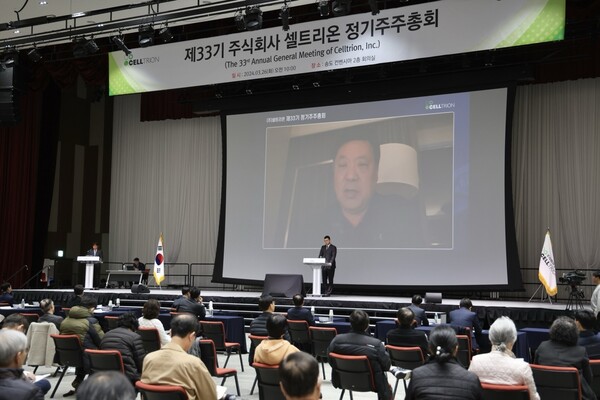Celltrion held its annual general shareholders meeting on Tuesday with covering agenda items including approval of certain changes to the articles of incorporation, appointment of directors, appointment of outside directors to serve as auditors, appointment of auditors, approval of director compensation limits, approval of granting stock options, and revision of the executive retirement benefit policy.

Seo Jin-seok, CEO of Celltrion and the eldest son of Celltrion Group Founder and co-Chairman Seo Jung-jin, presided over the meeting. His father is in the U.S. promoting the sales of Zymfentra, known as Remsima SC in Europe.
Shin Min-chul, finance and administration division head at Celltrion, highlighted the incorporation of Celltrion Healthcare's objectives into Celltrion's articles of incorporation as part of the merger process, emphasizing the addition of distribution and sales operations.
He also noted Zymfentra's FDA approval in October last year and ongoing negotiations with major Prescription Benefit Managers (PBMs) in the U.S.
Celltrion has ambitious plans to expand its portfolio to 11 commercialized biosimilars by 2025 and aims to have 22 biosimilar products by 2030.
During the meeting, Seo Jung-jin, who participated via video conference, shared updates on Zymfentra's market penetration in the U.S.
"It has been about a month and a half since I went on this business trip, and Zymfentra is now used in 2,800 hospitals by 7,500 prescribing doctors in the U.S.," Chairman Seo said. "By the end of June, we plan to meet these hospitals and introduce our product."

Seo stressed that 60 staff members from product development, marketing, and medical teams are out to visit the 2,800 hospitals in the U.S., and he is making rounds to these hospitals every two weeks together with the sales team, aiming to visit the hospitals a total of seven times by the end of June.
"This is to maximize sales and demand by launching Zymfentra early and to push for an early increase in sales," Seo said.
Zymfentra is a product that Celltrion obtained drug approval from the FDA in the U.S. in October last year. It is approved for adult patients with moderate to severe active ulcerative colitis and Crohn's disease, with a recommended dosage of 120mg every two weeks.
Retail shareholders voice concern about stock price and management wages
Meanwhile, retail shareholders continuously raised concerns that the company failed to manage the decline in Celltrion's stock price properly.
Notably, a retail shareholder questioned how the management is handling the situation regarding the approximately 17 million shares, close to 10 percent of the total shares, provided as collateral to financial institutions.
Seo Jin-seok responded that shares provided as collateral under financial law cannot be released to the market.
Furthermore, the son added that the collateral must remain in place for the contract conditions to be effective, and they are methods, including agreements, to prevent the use of collateral in short selling.
Subsequently, a shareholder inquired about the status of major shareholders, noting an increase in Blackrock's shares compared to last year and the exclusion of Vanguard.
According to Celltrion, as of Dec. 31 of last year, the status of major shareholders included Celltrion Holdings with 47 million shares (21.6 percent), National Pension Service with 11 million shares (5.2 percent), Chairman Seo Jung-jin with 8.2 million shares (3.8 percent), Ion Investment B.V with 7.8 million shares (3.6 percent), and BLACKROCK with 550,000 shares (2.5 percent).
"The increase in Blackrock's stake is due to the nature of index funds, as the size of the Kosdaq market grows, so does their share," Seo Jin-seok said. "As for Vanguard, they were excluded as major shareholders because a certain portion had decreased."
Complaints about director compensation also surfaced. A minority shareholder pointed out, "Despite the company's performance declining last year, the management received substantial performance compensation while the position of the shareholders remained unchanged."
In response, Seo Jin-seok explained that the company's management worked tirelessly to achieve the merger last year, in a way that wasn't visible to shareholders.
"Although there was a decline in performance last year up until the decision to merge in the third quarter, we were aggressively working towards to meet our sales targets," Seo Jin-seok said. "The merger with Celltrion Healthcare was decided upon to enhance cost competitiveness, which led to some adjustment in the pace of sales increase."
Regarding the suggestion to include stock price management in the performance compensation committee's evaluation criteria, the son responded, "While we can't disclose everything, we will consider incorporating your suggestion. We will also check whether other companies have such regulations and take measures so that it's neither excessive nor insufficient."
Controversial director remuneration cap increase agenda passed
During the meeting, the company also successfully navigated through contentious discussions regarding the increase in the director remuneration cap.
The proposal, which was one of the key agenda items, aimed to increase Celltrion's director remuneration cap from the existing 9 billion won ($6.7 million) to 20 billion won.
This move was justified by the company as necessary following the merger with the former Celltrion Healthcare, which resulted in an expanded board of directors.
"Following last year's merger, the combined director remuneration of both companies amounted to 11.2 billion won, exceeding Celltrion's standalone director remuneration cap of 9 billion won, necessitating an adjustment," said Shin, finance and administration division head at Celltrion. "The decision to raise the cap to 20 billion won was made after considering the average individual compensation levels of the top 10 companies by market capitalization on the Kospi market."
Prior to the shareholders' meeting, the National Pension Service (NPS), Celltrion's second-largest shareholder with a 5.27 percent stake, publicly opposed the proposal.
The NPS argued that the proposed remuneration cap was excessive when compared to the company's performance and compensation amounts.
Several shareholders present at the meeting echoed the NPS's concerns.
A representative of a small shareholders' association highlighted the ongoing trend among top market cap companies like Samsung, SK, and LG, which are reducing their director remuneration caps.
The representative questioned whether Celltrion could commit to a reduced execution of the remuneration cap to 12 billion won, even if the agenda of increasing the remuneration cap 20 billion won passes.
"We believe in responsible management, and the consideration for increasing the remuneration cap was based on practices of similarly sized listed companies, with no other intentions," Seo Jin-seok said. "We will take shareholder feedback into account and ensure that remuneration is executed within 12 billion won."
Related articles
- Celltrion’s Xolair biosimilar CT-P39 gets approval recommendation in Europe
- Celltrion launches Zymfentra in US, setting wholesale cost at $6,181.08 for 2 doses
- Celltrion completes FDA submission for Xolair biosimilar
- Celltrion's operating profit inches up in 2023 on robust biosimilars biz
- Celltrion launches Yuflyma 20mg for children with autoimmune diseases in US
- Celltrion partners with the Crohn's & Colitis Foundation to enhance IBD awareness in US
- Celltrion secures major PBM contract for Zymfentra in the US
- Celltrion secures major PBM contract for Yuflyma in the US

